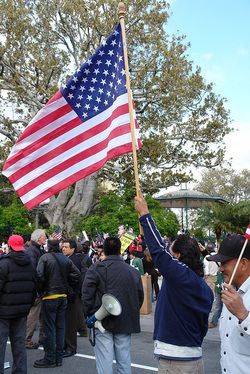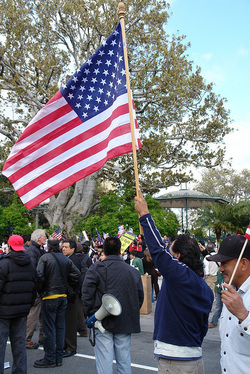
La propuesta se centra en cuatro pilares:
- Un camino hacia la ciudadanía para las personas que están fuera de estatus
- Las reformas para la inmigración legal
- Verificación de Empleo
- Nuevo programa para los futuros trabajadores de modo que el número de inmigrantes no autorizados se mantiene bajo control
Por cierto, ESTO TODAVÍA NO ES UNA LEY.
Con toda probabilidad, la elegibilidad para este "periodo condiciónal" tendrá un conjunto muy estricto de criterios. No sabemos todavía qué pasará finalmente (si hay algo), pero habrá una buena cantidad de argumento como la gente decide si se debe permitir que alguien con, digamos, una condena por conducir borracho para solicitar estatus condiciónal.
También son interesantes los dos grupos de personas que no tendrán que esperar tanto tiempo o estar sujeto a los mismos requisitos que cualquier otras personas: las llegadas de la infancia, y los trabajadores agrícolas. La propuesta reconoce que los trabajadores agrícolas proporcionan un beneficio a los EE.UU. hasta el punto de que no debería tener que esperar tanto como todos los demás. Aunque puede ser prematuro - si usted es indocumentado es posible que desee pensar en el trabajo agrícola.
¿Qué más podría hacer ahora, incluso antes de que algo es cierto?
Uno - es necesario presentar de nuevo los impuestos si usted les debe. Si usted ha estado pagando impuestos, usted tendrá que obtener copias de sus expedientes de impuestos del IRS.
Dos - usted está probablemente va a tener que demostrar que usted ha estado en los Estados Unidos. No es una mala idea para tratar de obtener la prueba de todo el tiempo. Por ejemplo: los registros escolares, nóminas, fotos, recibos, contratos de arrendamiento, y estados de cuenta bancarios.
Trés - usted va a tener que mostrar sus antecedentes penales entero. Eso incluye multas de tráfico (para delitos graves). Si usted ha estado aquí por mucho tiempo, esto puede llevar tiempo. Usted va a tener que mostrar estos registros a un abogado de inmigración que sería capaz de aconsejarle si se considera grave por motivos de inmigración.
Cuatro - Tienes que aprender Inglés, y tienes que aprender civismo. Para algunos, esto será fácil. Para otros, puede ser difícil. El momento para empezar a aprender Inglés es ahora. No se demore. Si la reforma es aprobada, usted no va a querer que su solicitud sea negada simplemente porque no se puede hablar inglés. Si usted no sabe inglés ya, se necesitará tiempo para aprenderlo. Empiece ahora. Sólo se le puede ayudar.
Les recuerdo una vez más: ESTO TODAVÍA NO ES UNA LEY.
Pero si se convierte en ley, usted va a querer estar preparado. Mantente en contacto con un abogado de inmigración. No te fíes de lo que se oye en la calle. TENGA CUIDADO. Habrá un montón de estafadores y defraudadores que tomarán su dinero. No hay ninguna ley todavía. Pero si eres inteligente puedes empezar y estar listo si y cuando llegue el momento.
Por último, si no lo he dejado claro, ESTO TODAVÍA NO ES UNA LEY.
Para leer el marco, haga clic aquí. (solamente en inglés)







 RSS Feed
RSS Feed
